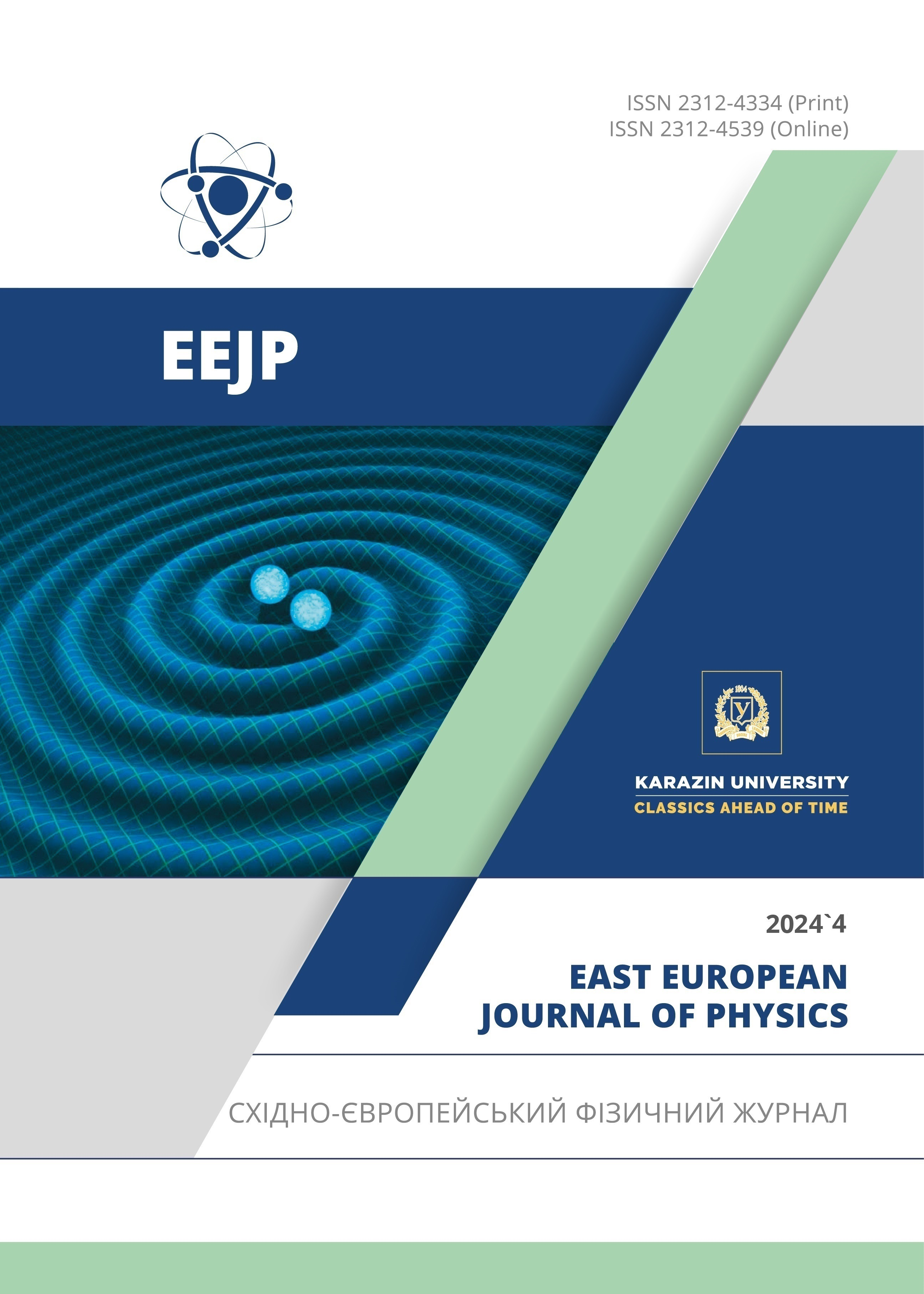Studies of the Impact of UV on CMC PVA/ZnO Nanocomposite Films Prepared with a Simple Solution Casting Method
Abstract
The synthesis of nanocomposite films comprising carboxymethyl cellulose/ polyvinyl alcohol (CMC PVA) mixed with zinc oxide nanoparticles (ZnO NPs) through a simple solution casting method is examined. Furthermore, the impact of ZnO NPs and UV‑irradiation exposure for varying durations (20,45,75h) on the morphology (FE-SEM) is investigated. The X-ray diffraction (XRD), Fourier-transform infrared (FTIR) spectroscopy, and ultraviolet-visible (UV-Vis) spectroscopy are utilized to analyze the as-prepared films. Furthermore, the field-emission scanning electron microscopy (FE-SEM) images reveal a noticeable change in the morphology of CMC PVA/ZnO nanocomposite films attributed to the significant impact of ZnO nanoparticles and UV exposure. The XRD spectra demonstrate a modification in the amorphous phase of the samples as a result of UV exposure The FTIR analysis reveals that the exposure to UV radiation positively influenced the polymer's structure, as evidenced by notable changes in the infrared peaks. Additionally, the UV-Vis spectroscopy results indicate that longer UV exposure times (75 hours) and the addition of ZnO nanoparticles resulted in improved absorption characteristics within the produced films. The nanocomposite films displayed an adjustable energy gap (Eg) that varied between (4.52 eV and 4.55 eV) as the duration of UV irradiation increased from (20 hours) (75 hours) led to a reduction in the energy gap (Eg) value to (4.50 eV). This phenomenon is believed to be caused by the substantial influence of UV radiation on the development of structural defects. Ultimately, the Energy gap Eg of the nanocomposite films was influenced by the duration of UV. The results demonstrate that there is significant potential for the utilization of CMC/PVA/ZnO nanocomposite films in various crucial optoelectronic applications.
Downloads
References
V.S. Sangawar, and M.C. Golchha, “Evolution of the optical properties of Polystyrene thin films filled with Zinc Oxide nanoparticles,” Int. J. Sci. Eng. Res. 4(6), 2700 (2013). https://www.ijser.org/onlineResearchPaperViewer.aspx?Evolution-of-the-optical-properties-of-Polystyrene-thin-films-filled-with-Zinc-Oxide-nanoparticles.pdf
H.G. Basavaraj, C.G. Renuka, C.A. Harihar, Y. Sangappax, B.L. Rao, and R. Madhukumar, “Physicochemical mechanical and optical properties of polymer inorganic composite thin films: Applications,” AIP Conference Proceedings, 2244, 110009 (2020). https://doi.org/10.1063/5.0009947
E.M. Abdelrazek, A.M. Abdelghany, A.E. Tarabiah, and H.M. Zidan, “AC conductivity and dielectric characteristics of PVA/PVP nanocomposite filled with MWCNTs,” Journal of Materials Science: Materials in Electronics, 30, 15521–15533 (2019). https://doi.org/10.1007/s10854-019-01929-2
A.Y. Yassin, A.M. Abdelghany, and R.S. Salama, and A.E. Tarabiah, “Structural, Optical and Antibacterial Activity Studies on CMC/PVA Blend Filled with Three Different Types of Green Synthesized ZnO Nanoparticles,” Journal of Inorganic and Organometallic Polymers and Materials, 33, 1855–1867 (2023). http://dx.doi.org/10.1007/s10904-023-02622-y
Y.M. Jawad, M.F.H. Al-Kadhemy, and J.A.S. Salman, “Synthesis structural and optical properties of CMC/MgO nanocomposites,” Mater. Sci. Forum, 1039, MSF, 104–114 (2021). https://doi.org/10.4028/www.scientific.net/MSF.1039
H.E. Ali, A. Atta, and M.M. Senna, “Physico-Chemical Properties of Carboxymethyl Cellulose (CMC)/Nanosized Titanium Oxide (TiO2) Gamma Irradiated Composite,” Arab J. Nucl. Sci. Appl. 48(4), 44–52 (2015).
A.E. Tarabiah, H.A. Alhadlaq, Z.M. Alaizeri, A.A.A. Ahmed, G.M. Asnag, and M. Ahamed, “Enhanced structural, “optical, electrical properties and antibacterial activity of PEO/CMC doped ZnO nanorods for energy storage and food packaging applications,”. J. Polym. Res. 29(5), 1-16 (2022). https://doi.org/10.1007/s10965-022-03011-8
A. Wibowo, M.A. Marsudi, M.I. Amal, et al., “ZnO nanostructured materials for emerging solar cell applications”. RSC Adv. 10(70), 42838-42859 (2020). https://doi.org/10.1039/D0RA07689A
Y. Sun, D. Wen, and X. Bai, “Nonvolatile ternary resistive switching memory devices based on the polymer composites containing zinc oxide nanoparticles”. Phys Chem Chem Phys. 20(8), 5771-5779 (2018). https://doi.org/10.1039/C7CP07887K
A. Svobodova, D. Walterova, and J. Vostalova, “Ultraviolet light induced alteration to the skin.,” Biomed. Pap. Med. Fac. Univ. Palacky. Olomouc. Czech. Repub. 150(1), 25–38 (2006). https://doi.org/10.5507/bp.2006.003
H. Lin, J. Hong, R. Nitta, Y. Kubota, Y. Katanayagi, H. Wagata, T. Kishi, et al., “Effects of UV irradiation on the electrical and optical properties of solutionprocessed transparent ZnO films,” Appl. Surf. Sci. 289, 135–141 (2019). https://doi.org/10.1016/j.mssp.2020.105266
A.A. Al-Muntaser, R.A. Pashameah, K. Sharma, E. Alzahrani, M.O. Farea, and M.A. Morsi. “α-MoO3 nanobelts/CMC-PVA nanocomposites: hybrid materials for optoelectronic and dielectric applications,” J. Polym. Res. 29(7), 1-11 (2022). https://doi.org/10.1007/s10965-022-03134-y
M.M. Abutalib, , A. Rajeh . “Structural, thermal, optical and conductivity studies of Co/ZnO nanoparticles doped CMC polymer for solid state battery applications”. Polymer Testing.Volume 91, , 106803,2020 https://doi.org/10.1016/j.polymertesting.2020.106803
A.A. AlMuntaser, E. Alzahrani, H.M. Abo-Dief, A. Saeed, E.M. Alshammari, A.M. Al-Harthi, and A.E. Tarabiah, “Tuning the structural, optical, electrical, and dielectric properties of PVA/PVP/CMC ternary polymer blend using ZnO nanoparticles for nanodielectric and optoelectronic devices,” Optical Materials, 140, 13901 (2023). https://doi.org/10.1016/j.optmat.2023.113901
K.H.H. Al-Attiyah, A. Hashim, and S.F. Obaid, “Fabrication of novel (carboxy methyl cellulose–polyvinylpyrrolidone–polyvinyl alcohol)/lead oxide nanoparticles: structural and optical properties for gamma rays shielding applications,” Int. J. Plast. Technol. 23(1), 39–45 (2019). https://doi.org/10.1007/s12588-019-09228-5
A. Hashim, and A. Hadi, “Novel lead oxide polymer nanocomposites for nuclear radiation shielding applications,” Ukrainian Journal of Physics, 62(11), 978–983 (2017). https://doi.org/10.15407/ujpe62.11.0978
Tafahm Ahmed Jasim, Asrar Abdulmunem Saeed, Farah Jawad Kadhum and Mahasin F. Hadi AlKadhemy, “Effect of Gamma Irradiation on The Optical Properties of PVA / Ag Nano-composite ” GJSR Journal. Vol. 8(2), pp,2020. http://dx.doi.org/10.1088/1757-899X/928/7/072137
J.D. Patterson, and B.C. Bailey, Solid-state physics: introduction to the theory, (Springer Science & Business Media, 2007).
N.A. Darweesh, A.A. Saeed, and M.F. Al-Kadhemy, “Influence of Weathering on Physical Properties and Sun Light Transmitted through PMMA/ Safranin Films for Greenhouse Applications,” Mustansiriyah Journal of Pure and Applied Sciences, MJPAS 1(1), 40-53 (2023).
F.M. Nada, S.A. Hussain, S.K. Muhammad, and A.H.O. Alkhayatt, “Hydrothermally growth of TiO2 Nanorods, characterization and annealing temperature effect,” Kuwait Journal of Science, 48(3), 1-10 (2021). https://doi.org/10.48129/kjs.v48i3.10417
P.S. Sundaram, T. Sangeetha, S. Rajakarthihan, R. Vijayalaksmi, A. Elangovan, and G. Arivazhagan, “XRD structural studies on cobalt doped zinc oxide nanoparticles synthesized by coprecipitation method: Williamson-Hall and size-strain plot approaches,” Physica B: Condensed Matter, 595, 412342 (2020). https://doi.org/10.1016/j.physb.2020.412342
C. Hammond, The basics of cristallography and diffraction, (Oxford, 2001).
T. Ji, R. Zhang, X. Dong, D.E. Sameen, S. Ahmed, S. Li, and Y. Liu, “Effects of Ultrasonication Time on the Properties of Polyvinyl Alcohol/Sodium Carboxymethyl Cellulose/Nano-ZnO/Multilayer Graphene Nanoplatelet Composite Films,” Nanomaterials, 10(9), 1797 (2020). https://doi.org/10.3390/nano10091797
S.L. Perumal, P. Hemalatha, M. Alagara, and K. N. Pandiyaraj, “Investigation of structural, optical and photocatalytic properties of Sr doped ZnO nanoparticles,” Int. J. Phys. Sci. 4, 1-13 (2015). https://doi.org/10.23851/mjs.v34i1.1226
Y. Zahedi, B. Fathi-Achachlouei, and A.R. Yousefi, “Physical and mechanical properties of hybrid montmorillonite/zinc oxide reinforced carboxymethyl cellulose nanocomposites,” International Journal of Biological Macromolecules, 108, 863–873 (2018). https://doi.org/10.1016/j.ijbiomac.2017.10.185
G.A.H.A. Jabbar, A.A. Saeed, and M.F.Hadi AL-Kadhemy, “Optical characteristics and bacterial-resistance ability of PVA/ZnO nanocomposites,” Kuwait Journal of Science, 50(3), 209-215 (2023). https://doi.org/10.1016/j.kjs.2023.03.004
Q.M. Al-Bataineh, A.A. Ahmad, A.M. Alsaad, and A.D. Telfah, “Optical characterizations of PMMA/metal oxide nanoparticles thin films: bandgap engineering using a novel derived model,” Heliyon, 7(1), e05952 (2021). https://doi.org/10.1016/j.heliyon.2021.e05952
M. Anandalli, T.M. Kanakaraj, V. Hebbar, J. Naik, and R.F. Bhajantri, “Physico-chemical properties of PMMA/ZnO nanocomposite capped with 1 chloro-9, 10-bis (phenyl ethynyl) anthracene,” in AIP Conference Proceedings, 1953(1), 30189 (2018). https://doi.org/10.1063/1.5032524
S. Maensiri, P. Laokul, and V. Promarak, “Synthesis and optical properties of nanocrystalline ZnO powders by a simple method using zinc acetate dihydrate and polyvinyl pyrrolidone,” J. Cryst. Growth, 289(1), 102-106 (2006). https://doi.org/10.1016/j.jcrysgro.2005.10.145
S. Hashem, M. Fadhil, and K. Naji, “Study Physical Characteristics of Polyvinyl Alcohol/Carboxymethyl cellulose Blend Films,” 55(393), 298–305 (2022). https://doi.org/10.48129/kjs.20553
H. Helmiyati, Z.S.Z. Hidayat, I.F.R. Sitanggang, and D. Liftyawati, “Antimicrobial packaging of ZnO–Nps infused into CMC–PVA nanocomposite films effectively enhances the physicochemical properties,” Polymer Testing, 104, 107412 (2021). https://doi.org/10.1016/j.polymertesting.2021.107412
V.S. Sangawar, and M.C. Golchha, “Evolution of the optical properties of Polystyrene thin films filled with Zinc Oxide nanoparticles,” Int. J. Sci. Eng. Res. 4(6), 2700-2705 (2013). https://www.ijser.org/researchpaper/Evolution-of-the-optical-properties-of-Polystyrene-thin-films-filled-with-Zinc-Oxide-nanoparticles.pdf
I. Kim, K. Viswanathan, G. Kasi, K. Sadeghi, S. Thanakkasaranee, and J. Seo,“ Poly(Lactic Acid)/ZnO Bionanocomposite Films with Positively Charged ZnO as Potential Antimicrobial Food Packaging Materials,” Polymers, 11(9), 1427 (2019). https://doi.org/10.3390/polym11091427
Yao, Y., Sun, Z., Li, X., Tang, Z., Li, X., Morrell, J. J., Liu, Y., Li, C., & Luo, Z. (2022). Effects of Raw Material Source on the Properties of CMC Composite Films. Polymers, 14(1), 1–15. https://doi.org/10.3390/polym14010032
N.T.T. Thuy, et al., “Green synthesis of silver nanoparticles using plectranthus amboinicus leaf extract for preparation of cmc/pva nanocomposite film,” J. Renewable Mater. 9(8), 1393–1411 (2021). https://doi.org/10.32604/jrm.2021.015772
A.M. Youssef, et al., “Development and Characterization of CMC/PVA Films Loaded with ZnO-Nanoparticles for Antimicrobial Packaging Application,” Der Pharma Chemica, 9(9), 157–163 (2017).
T.S. Soliman, A.M. Rashad, I.A. Ali, S.I. Khater, and S.I. Elkalashy, “Investigation of Linear Optical Parameters and Dielectric Properties of Polyvinyl Alcohol/ZnO Nanocomposite Films,” Phys. Status Solidi Appl. Mater. Sci. 217(19), 1-8 (2020). https://doi.org/10.1002/pssa.202000321
S. Villarruel, et al., “Changes induced by UV radiation in the presence of sodium benzoate in films formulated with polyvinyl alcohol and carboxymethyl cellulose,” Mater. Sci. Eng. C, 56, 545–554 (2015). https://doi.org/10.1016/j.msec.2015.07.003
Copyright (c) 2024 Sarah A. Ibrahim, Abderrazek Oueslati, Abdelhedi Aydi

This work is licensed under a Creative Commons Attribution 4.0 International License.
Authors who publish with this journal agree to the following terms:
- Authors retain copyright and grant the journal right of first publication with the work simultaneously licensed under a Creative Commons Attribution License that allows others to share the work with an acknowledgment of the work's authorship and initial publication in this journal.
- Authors are able to enter into separate, additional contractual arrangements for the non-exclusive distribution of the journal's published version of the work (e.g., post it to an institutional repository or publish it in a book), with an acknowledgment of its initial publication in this journal.
- Authors are permitted and encouraged to post their work online (e.g., in institutional repositories or on their website) prior to and during the submission process, as it can lead to productive exchanges, as well as earlier and greater citation of published work (See The Effect of Open Access).








